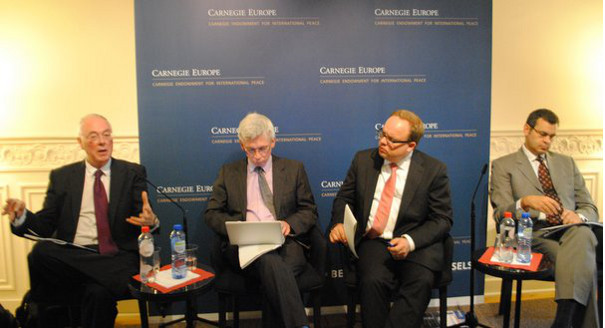Registration
Thank you!
You will receive an email confirming your registration.
IMGXYZ3777IMGZYXThe recent Chicago Summit broke little new ground on NATO's nuclear posture and its twenty-eight member states continue to espouse a diverse spectrum of views on the Alliance's nuclear arsenal. Although leaders on both sides of the Atlantic are preoccupied with a number of current pressing issues, NATO's nuclear dilemmas cannot be put off much longer without undermining its cohesion and strength.
Carnegie's Paul Schulte and Sinan Ülgen, together with Malcolm Chalmers, Director of UK Defence Policy at the Royal United Services Institute, discussed nuclear weapons in Europe and the future of NATO. Carnegie Europe's Jan Techau moderated.
Highlights
- Political Factors: Chalmers presented three political factors that must be addressed in order to refine the role of non-strategic nuclear weapons in Europe.
- State Disarmament: The potential withdrawal of these weapons might have an effect on member state nuclear disarmament;
- Russia: A withdrawal of these weapons could act to reassure Russia, despite efforts already made to give Russia confidence, such as the NATO-Russia Founding Act;
- United States: The political dynamic of burden sharing between the United States and Europe and, in particular, U.S. concerns about this issue must be addressed, Chalmers concluded.
- State Disarmament: The potential withdrawal of these weapons might have an effect on member state nuclear disarmament;
- Finding a Balance: There are a number of critical political, symbolic, and operational tensions that must be taken into account when finding a balance between the demands of deterrence, the desire to improve relations with Russia and to contribute to the global zero project, US. concerns over burden sharing and the need for reassurance for more exposed states like the Baltic Republics and Poland, Schulte explained. These states are particularly concerned with the U.S. security guarantee, Chalmers added. Panelists discussed whether an appropriate balance could be designed with farsighted decisions to move toward less internally contentious forms of burden-sharing that would satisfy American concerns and reassure more exposed states that their worries about Russia are not being ignored.
- Threat Perception: Ülgen addressed the debate from the perspective of the southern flank of NATO, raising three points:
- Serving a Political Purpose: Turkey perceives these weapons as continuing to serve a political purpose, and objects to the attempts to remove them without a consensus within NATO;
- A Comfortable Debate: Ülgen observed that there is no real debate in Turkey on the removal of the tactical nuclear weapons as there is no anti-nuclear political movement;
- Possible New Locations: Ülgen suggested that, should some Alliance members remove these weapons in the future, policymakers in Ankara might not object to storing the weapons in Turkey because it could cement their security relationship with the United States.
- Serving a Political Purpose: Turkey perceives these weapons as continuing to serve a political purpose, and objects to the attempts to remove them without a consensus within NATO;
- The Future of NATO: With the broad guidelines of the Deterrence and Defense Posture Review now agreed upon, Chalmers and Schulte expected that the NATO bureaucracy would look at whether the current basing arrangements are appropriate or in need of reorientation. They put forward options for what they called “smart sharing,” arguing that although such measures have varying costs and uncertain prospects, a determined and carefully considered mix of investments, deployments, exercises, visits, speeches, and statements could address the reasonable concerns of the most exposed allies.
